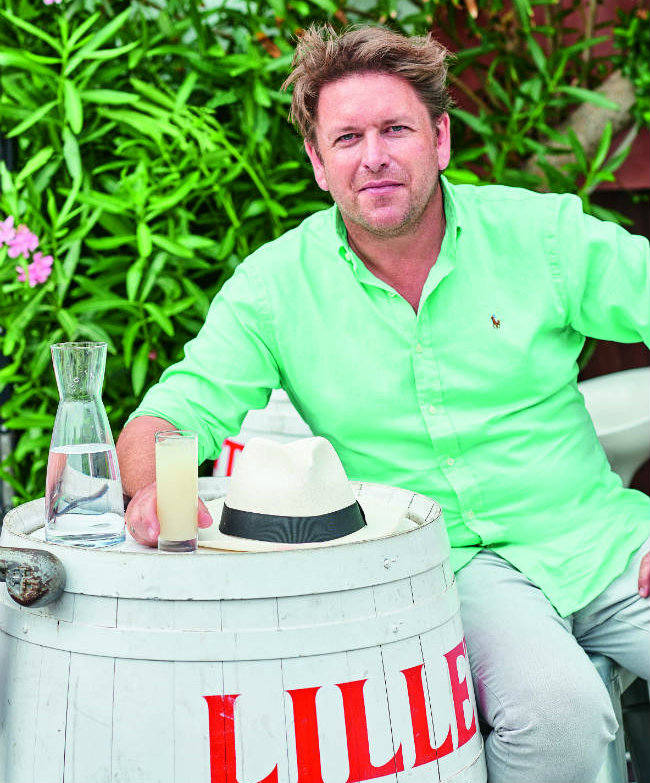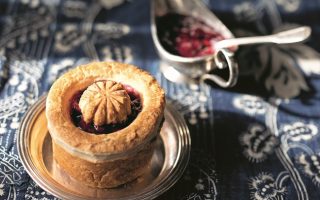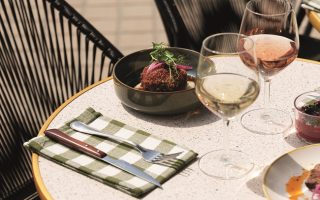Interview with the Chef: James Martin’s French Adventure
It’s been 35 years since TV chef James Martin first learned the ins and outs of vegetable prep amid the chaos of a French Michelin-starred kitchen. Back on his old stomping ground at long last for his cookery travelogue, James Martin’s French Adventure, he’s more than made up for lost time, as Marion Sauvebois discovers…
Peeling mounds of vegetables round the clock in the bowels of a French Michelin-starred restaurant, all the while doing his darnedest not to incur the wrath of its mercurial chefs, 12-year-old James Martin quickly learned that: a) he was destined for the bedlam of a professional kitchen; and b) to dodge airborne ladles.
“Within the first ten minutes I knew this was what I wanted to do,” he chuckles warmly. “I had ventured into this proper professional kitchen full of irate French chefs, shouting and screaming and I never really looked back. I was fascinated by the pace, the atmosphere. I didn’t speak French but I could understand there was a ladle coming towards me… You quickly learn! It’s one of those opportunities where you look at it from the outside and think, what the hell are you doing? But I loved it. My dad used to work in Saint-Émilion at a part-time job importing wine and that’s how it started. I tagged along and rather than walk around the town, I just wanted to work in a kitchen for something to do more than anything else.”
With hindsight, the language barrier was probably a boon. “I’d rather be shouted and screamed at and not know what they were saying till 20 years later,” muses the affable Yorkshireman. “It was beneficial being in France. You weren’t treated that great and that was a good thing. You don’t know any different.”
Even so, few would have survived such a thankless initiation or the crew of apoplectic Frenchmen with a penchant for lobbing rolling pins in fits of rage. But Martin thrived on the mayhem – and not only because his senses were dulled from the bottles of wine fobbed on him in lieu of actual wages.
“As a young kid, it was much better than money!” he laughs at the recollection. “I started a little collection of bottles of red wine.”
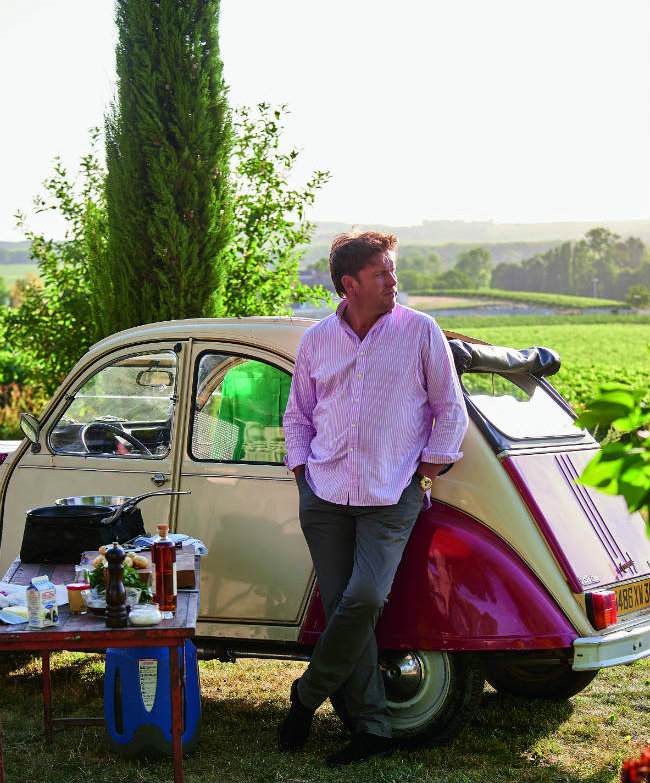
James Martin poses with the trusty Citroën 2CV that once belonged to Keith Floyd. Photo: © HARDIE GRANT
THE SMALL SCREEN BECKONS
Back home, he forged ahead with his training. His break came in 1996, when at 22, the ambitious head chef at the Hotel du Vin in Winchester was spotted by a producer and invited to take a screen test. A hugely successful TV career ensued, with a ten-year stint on Saturday Kitchen as its peak. “I still don’t know how it all worked at this stage,” he interjects, disbelief in his voice.
Before he had quite realised how, 35 years had gone by since his first formative steps in Saint-Émilion and he itched to return in earnest to the place he “owe[s] everything to”. In a stroke of luck, Martin received a call from his hero Keith Floyd’s daughter, wondering if he would be interested in her dad’s beaten-up old Citroën 2CV. 72 hours later the old banger was taking pride of place in his garage and the seed for his cookery travelogue – and book, James Martin’s French Adventure – was sowed.
“I just thought: wouldn’t it be great to take the car and travel back through France, visit the places that inspired me, that I loved? And to show people areas of France they’ve never seen before.”
Rocking a rather fetching panama hat, in the intimate ITV series he tootles down pothole-ridden country lanes in the clapped-out deux chevaux – with a dinged wing and frayed canvas roof to boot – in search of real French terroir.
“It was the perfect car for France because of the potholes,” he says, rushing to his trusty 2CV’s defence at the suggestion it may not have been the best car for the task. “You’d ruin a normal car on roads like that. I didn’t have any problems. There was just the fact that it was bloody 36 degrees and the air conditioning was just taking the roof off. I knew it would make it – my mechanic made sure it would.”
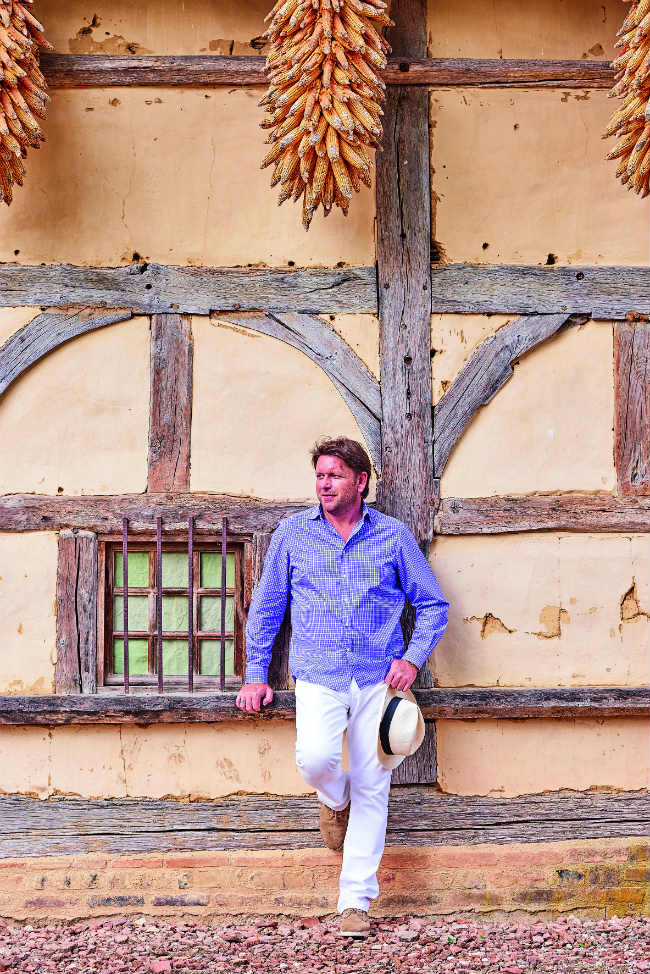
Chef James Martin going back to his culinary roots in rural France. Photo: © HARDIE GRANT
BREAD AND WINE
Part pilgrimage – with a pitstop in his early stomping ground – part homage to the larger-than-life Floyd, his jaunt sees him break bread with local chefs, glugging gallons of wine and joshing with his producer – namely by telling him off on camera for sourcing the wrong kind of frisée for his Lyonnaise egg and bacon salad.
And there’s the memorable episode where he fires up quails and sausages on Michel Roux Senior’s barbecue in the illustrious chef’s Saint-Tropez pied-à-terre.
“It wasn’t planned; I just phoned him up and said, we’re filming down there: any chance you could come and wander round a market with us? He said, I can do one better than that, why don’t you come to the house and cook? And that was it,” he adds with barely-veiled awe. “That was pretty special.”
The refreshingly level-headed TV chef was never one to court fame– paradoxically, the secret to his continued success, he insists. “All my life I wanted to be a chef, TV wasn’t even on the radar. It’s never been about celebrity. It’s always been about the food. You have to be passionate. That’s what I’ve done. When so many chefs come and go, that was the right decision to make.”
Despite his industry kudos and legions of Twitter followers (he cannot fathom how more than 400,000 people could show an interest), he admits to being star-struck on more than one occasion on Saturday Kitchen; not least trimming bread crusts in front of Antonio Banderas.
“I remember interviewing Jackie Collins one week and Antonio Banderas the following week. We’ve had Sir Michael Parkinson, Daniel Boulud on and you think: what the bloody hell is going on here? That’s kind of surreal. You look around and you’ve got a Hollywood A-lister sat there. And you think, what am I doing here? He’s probably thinking the same. These are moments you’ll never forget.”
His seemingly rash departure from the morning show, after a decade at the helm, came as a blow to his loyal audience. He only recently revealed that witnessing the death of Dubai media boss Dominic De Sousa of a suspected heart attack at the BBC Good Food Awards in 2015 prompted his decision to slow down.
He is more guarded on the subject now but concedes he had reached saturation point. “I had done it for ten years and it’s a long time when you’ve got restaurants. Imagine not being able to cook at your restaurant on Friday and Saturday night. It’s a massive commitment. I felt like I didn’t want to do it anymore. Life is short and it’s nice to challenge yourself to do other things. I’m pretty sure I made the right decision.”
Although not one to rest on his laurels, Martin was riddled with nerves at the prospect of fronting French Adventure after (an albeit) brief absence. “I was nervous when we filmed in France. We knew we had something good here but you think, are people going to watch it? There are so many things that can go wrong that are out of your control.”
His gamble has more than paid off. At last count, the recipe book based on the series was a number one bestseller – strangely, he notes, the only indulgent volume to top the charts amid a sea of health food and calorie-busting A-to-Zs. Among the book’s 80 hearty recipes his favourite is the cream-slathered blanquette. Although his is the traditional, honest-to-goodness sort – none of this deconstructed nonsense. “Chefs mess around too much with it, cook it all separately. Put it all in the bloody pot,” he launches into an almighty rant.
“I don’t follow trends; I never have,” he goes on. “You’ll only have a job for 23 years in this game if you believe in what you believe in. I took over Saturday Kitchen and we changed it; we took a risk. Cookery on TV was immaculate but people who cook Sunday lunch realise it’s not like that. It’s carnage and that’s what I wanted. I wanted to make it real for people.”
With the end of French Adventure drawing near – on our screens at least – he is raring for round two. His Citroën, he chortles, has fared rather well on the continent and has at least one last spin in her.
“At this moment I don’t know what the hell I’m going to do,” admits Martin, who is currently entirely focused on the far more pressing matter of training his Cocker Spaniel puppy. “I’ve got a meeting with the powers that be in the next two weeks. I’ll either get a P45 or my passport to go again. Who knows?”
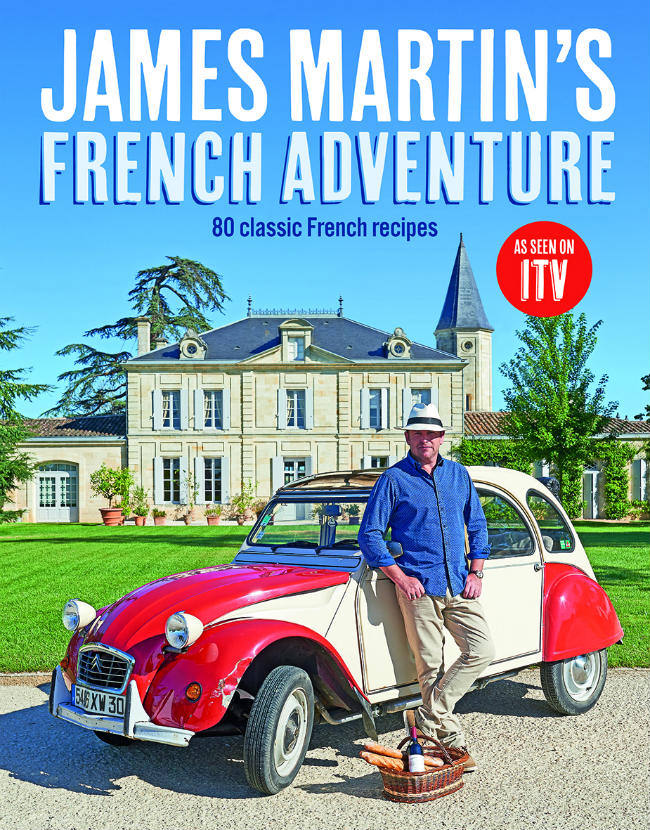
James Martin’s “French Adventure”
RECIPES FROM THE BOOK
WHOLE JOHN DORY WITH CLAMS & COURGETTES
Serves two.
Also known as Saint Peter’s fish, after the patron saint of fishermen, John Dory is a beautiful fish. This was the first dish I cooked on the show, and no sooner had I finished and walked away to wash my hands than some eager French people huddled around the pan and started to dive in. A vote of confidence, if ever I saw one!
INGREDIENTS
2 courgettes, thickly sliced
2 heritage tomatoes, thickly sliced
2 shallots, thinly sliced
1 x 1kg John Dory, gutted and fins removed
50ml olive oil
375ml dry white wine
15 basil leaves
300g clams, washed
A handful of flat-leaf parsley leaves
Sea salt and freshly ground black pepper
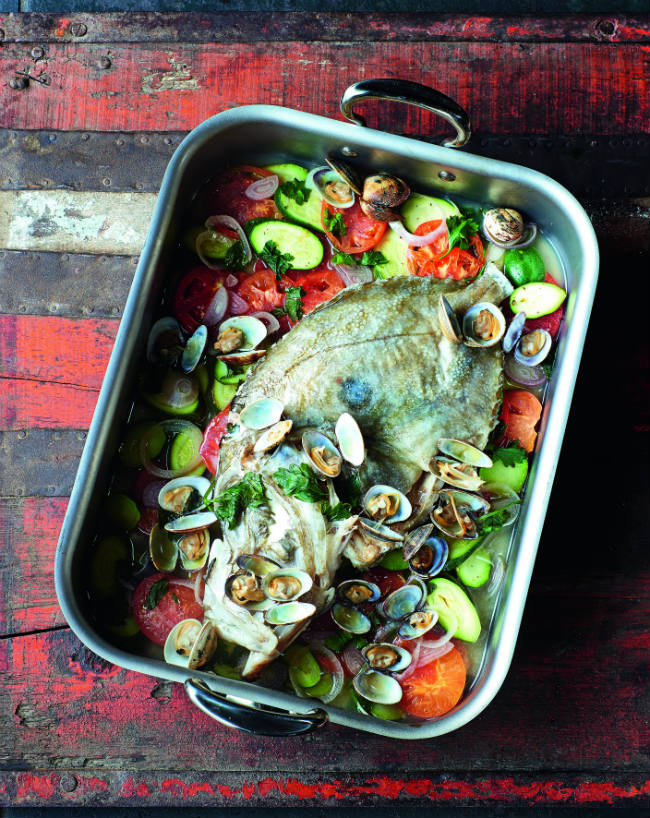
John Dory with clams and courgettes. Photo: James Martin’s French Adventure
1 Preheat the oven to 200°C/400°F/gas mark 6.
2 Arrange the courgettes and tomatoes over the base of a roasting tin. Slot the shallot slices in between the courgettes and tomatoes.
3 Season with salt and pepper.
4 Season the John Dory with salt and pepper, place on top of the vegetables and drizzle with half the olive oil. Pour the white wine over and scatter with the basil leaves. Cover tightly with foil and cook in the oven for 20 minutes. Carefully lift off the foil and add the clams, then cover again and return to the oven for a further five minutes or until the clams open up (discard any that remain closed).
5 Remove from the oven, scatter over the parsley leaves and add a final drizzle of olive oil.
BRAISED CHICKEN WITH RED WINE VINEGAR & TARRAGON
Serves four.
We ate so many lovely braised dishes in France that it was difficult to choose just a few to go in the book, but this one made the cut: tarragon is such a classic French herb and the red wine vinegar really lifts the sauce.
INGREDIENTS
1-2 tablespoons olive oil
1 x 1.25-1.5kg chicken, jointed into 8 portions
Knob of butter
1 teaspoon tomato purée
2 garlic cloves, finely chopped
50ml red wine vinegar
110ml white wine
500ml chicken stock
2 tomatoes, skinned
1 heaped teaspoon Dijon mustard
250ml whipping cream
1 tablespoon chopped tarragon
Sea salt and freshly ground black pepper
For the mash
500g potatoes, peeled and cut into chunks
125ml double cream
125g unsalted butter, softened

Braised chicken. Photo: James Martin’s French Adventure
1 Preheat the oven to 180°C/350°F/gas mark 4.
2 Heat the olive oil in a large ovenproof frying pan or flameproof casserole over medium to high heat. Season the chicken with salt and pepper and fry to a good golden crisp all over.
3 Remove the chicken from the pan, then tip out the fat, wipe the pan clean, and add the butter. Stir in the tomato purée and cook over medium heat for two minutes, then add the garlic and cook for a further minute.
4 Add the vinegar and reduce until it has all but disappeared.
5 Add the wine and reduce by a third. Pour in the chicken stock and bring to a simmer, then return the chicken to the pan, cover with a lid and transfer to the oven. Cook for 20 minutes or until the chicken is cooked through.
6 Quarter the tomatoes and scoop out the seeds.
7 Cut the tomato flesh into small dice and set aside.
8 To make the mash, cook the potatoes in a saucepan of lightly salted water for 15 minutes until tender. Drain and pass through a potato ricer back into the saucepan and stir over low heat to dry out.
9 Gently warm the cream in a small saucepan until just boiling, then remove from the heat. Gradually beat a little butter and then a little of the cream into the mash. Keep adding and beating until the potato is soft and creamy, then season with salt and pepper to taste.
10 Remove the pan from the oven, lift out the chicken pieces and keep warm while you finish the sauce. Strain the sauce through a sieve into a clean saucepan and bring back to the boil. Whisk in the mustard and cream, then simmer to reduce and thicken slightly.
11 Check the seasoning, then add the diced tomato and tarragon.
12 Pour the sauce over the chicken and serve with the mash.
LEMON VERBENA MERINGUES WITH VANILLA CREAM AND STRAWBERRIES
Serves four.
This herb is my favourite in my garden at home – it’s perfect for infusing custard for crème brûlée and making flavoured teas (if you like that sort of thing). Here the leaves add a gentle citrus note to the meringues, but if you can’t get hold of any, a little finely grated lemon zest will do the trick.
INGREDIENTS
For the meringues
6 egg whites
180g icing sugar, sifted
180g caster sugar
A few tiny lemons
Verbena leaves
For the sauce and filling
375g strawberries, hulled
400ml double cream
2 tablespoons icing sugar
1 vanilla pod, split and seeds scraped
To garnish
4 sprigs of lemon verbena
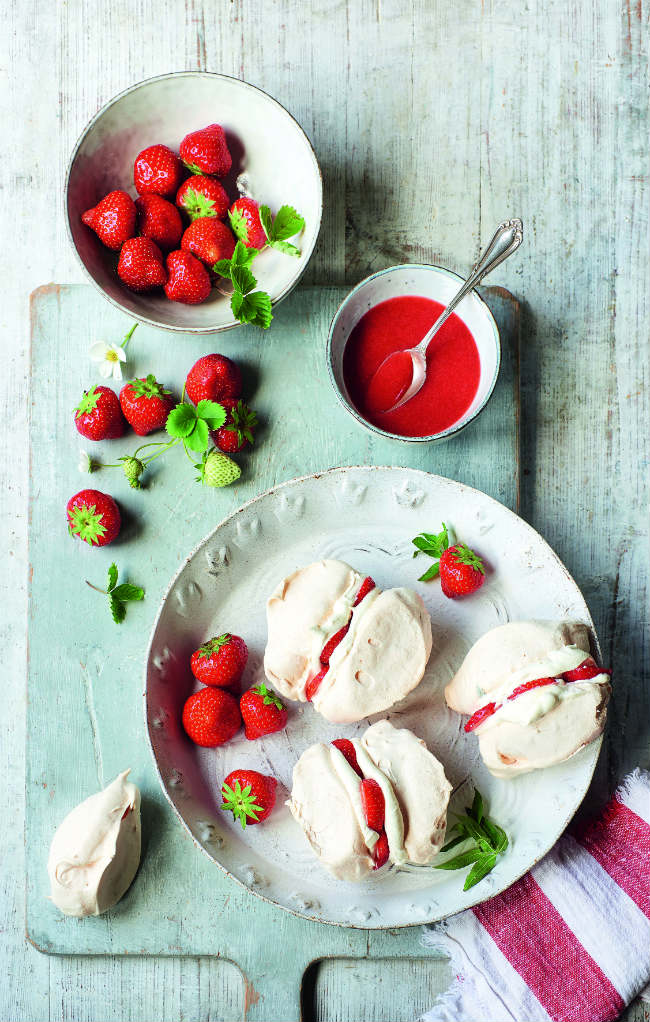
lemon verbena meringues. Photo: James Martin’s French Adventure
1 Preheat the oven to 100°C/200°F/gas mark 1/4. Line a large baking sheet with baking parchment.
2 To make the lemon verbena meringues, use an electric mixer to whisk the egg whites with the caster sugar to stiff peaks. Add the icing sugar and continue to whisk for 4-6 minutes or until the meringue is smooth and shiny. Stir in the lemon verbena leaves.
3 Using two large metal spoons, shape a quenelle of the mixture and place it on the prepared baking sheet. Repeat the process to make seven more meringues, spacing them well apart on the baking sheet.
4 Place the meringues in the oven and cook for two hours.
5 Remove the meringues from the oven and allow to cool slightly before gently easing them from the baking sheet with a palette knife.
6 Transfer to a wire rack and set aside.
7 Place 250g of the strawberries in a small food processor and blend until smooth, then pass through a sieve into a bowl to remove the seeds.
8 Thinly slice the remaining strawberries.
9 To make the filling, whip the cream, icing sugar and vanilla seeds together until soft peaks form.
10 To serve, spoon some of the cream onto the base of half of the meringues, top with a few strawberry slices and sandwich together with the remaining meringues.
11 Garnish with the lemon verbena sprigs and serve the strawberry sauce alongside in a bowl.
Purchase the book on Amazon at the link below:
Share to: Facebook Twitter LinkedIn Email
Leave a reply
Your email address will not be published. Required fields are marked *

